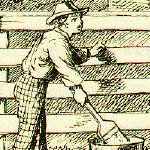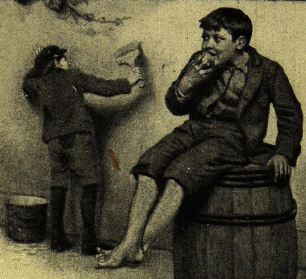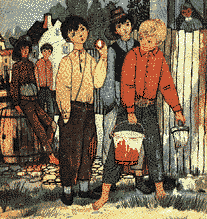 Tom appeared on the sidewalk10 with a bucket11 of whitewash12 and a long-handled brush. He surveyed the fence, and all gladness left him and a deep melancholy settled down upon13 his spirit. Thirty yards14 of board15 fence nine feet high. Life to him seemed hollow16, and existence but a burden17. Sighing18, he dipped19 his brush and passed it along the topmost plank20; repeated the operation; did it again; compared the in significant whitewashed streak21 with the far-reaching continent of unwhitewashed fence, and sat down on a tree-box discouraged. Jim came skipping out at the gate with a tin pail22, and singing Buffalo Gals. Bringing water from the town pump had always been hateful23 work in Tom's eyes, before, but now it did not strike him so. He remembered that there was company at the pump. White, mulatto, and negro boys and girls were always there waiting their turns, resting, trading playthings, quarrelling24, fighting, skylarking25. And he remembered that although the pump was only a hundred and fifty yards off, Jim never got back with a bucket of water under an hour - and even then somebody generally had to go after him. Tom said:
Tom appeared on the sidewalk10 with a bucket11 of whitewash12 and a long-handled brush. He surveyed the fence, and all gladness left him and a deep melancholy settled down upon13 his spirit. Thirty yards14 of board15 fence nine feet high. Life to him seemed hollow16, and existence but a burden17. Sighing18, he dipped19 his brush and passed it along the topmost plank20; repeated the operation; did it again; compared the in significant whitewashed streak21 with the far-reaching continent of unwhitewashed fence, and sat down on a tree-box discouraged. Jim came skipping out at the gate with a tin pail22, and singing Buffalo Gals. Bringing water from the town pump had always been hateful23 work in Tom's eyes, before, but now it did not strike him so. He remembered that there was company at the pump. White, mulatto, and negro boys and girls were always there waiting their turns, resting, trading playthings, quarrelling24, fighting, skylarking25. And he remembered that although the pump was only a hundred and fifty yards off, Jim never got back with a bucket of water under an hour - and even then somebody generally had to go after him. Tom said:
"Say, Jim, I'll fetch the water if you'll whitewash some."
Jim shook26 his head and said:
"Can't, Mars Tom. Ole missis, she tole me I got to go an' git dis water an' not stop foolin' roun' wid anybody27. She say she spec'28 Mars Tom gwine to ax29 me to whitewash, an' so she tole me go 'long30 an' 'tend31 to my own business - she 'lowed she'd 'tend to de whitewashin'."
"Oh, never you mind what she said, Jim. That's the way she always talks. Gimme the bucket - I won't be gone only a a minute. She won't ever know."
"Oh, I dasn't, Mars Tom. Ole missis she'd take an' tar32 de head off'n me. 'Deed33 she would."
"She! She never licks anybody - whacks34 'em over the head with her thimble35 - and who cares for that, I'd like to know. She talks awful, but talk don't hurt - anyways it don't if she don't cry. Jim, I'll give you a marvel. I'll give you a white alley36!"
Jim began to waver37.
"White alley, Jim! And it's a bully38 taw39."
"My! Dat's a mighty gay40 marvel, I tell you! But Mars Tom I's powerful 'fraid41 ole missis -"
"And besides, if you will I'll show you my sore42 toe43."
Jim was only human - this attraction was too much for him. He put down his pail, took the white alley, and bent44 over the toe with absorbing interest while the bandage was being unwound45. In another moment he was flying down the street with his pail and a tingling46 rear, Tom was whitewashing with vigor, and Aunt Polly was retiring from the field with a slipper47 in her hand and triumph in her eye.
But Tom's energy did not last. He began to think of the fun he had planned for this day, and his sorrows48 multiplied. Soon the free boys would come tripping along49 on all sorts of delicious expeditions, and they would make a world of fun of him for having to work - the very thought of it burnt him like fire. He got out his worldly50 wealth and examined it - bits of toys, marbles51, and trash52; enough to buy an exchange of work, maybe, but not half enough to buy so much as half an hour of pure freedom. So he returned his straitened53 means to his pocket, and gave up the idea of trying to buy the boys. At this dark and hopeless moment an inspiration burst54 upon him! Nothing less than a great, magnificent inspiration.
He took up55 his brush and went tranquilly56 to work. Ben Rogers hove57 in sight presently - the very boy, of all boys, whose ridicule he had been dreading58. Ben's gait59 was the hop-skip-and-jump - proof enough that his heart was light and his anticipations60 high. He was eating an apple, and giving a long, melodious whoop61, at intervals, followed by a deep-toned62 ding-dong-dong, ding-dong-dong, for he was personating a steamboat63. As he drew near, he slackened64 speed, took the middle of the street, leaned far over65 to starboard66 and rounded to ponderously67 and with laborious pomp and circumstance68 - for he was personating the Big Missouri, and considered himself to be drawing nine feet of water. He was boat and captain and engine-bells combined, so he had to imagine himself standing on his own hurricane-deck69 giving the orders and executing them:
"Stop her, sir! Ting-a-ling-ling!" The headway70 ran almost out71, and he drew up slowly toward the sidewalk.
"Ship up to back! Ting-a-ling-ling!" His arms straightened and stiffened72 down his sides.
"Set her back on the stabboard73! Ting-a-ling-ling! Chow! ch-chow-wow! Chow!" His right hand, meantime, describing stately74 circles - for it was representing a forty-foot wheel.
"Let her go back on the labboard75! Ting-a-ling-ling! Chow-ch-chow-chow!" The left hand began to describe circles.
"Stop the stabboard! Ting-a-ling-ling! Stop the labboard! Come ahead on the stabboard! Stop her! Let your outside turn over slow! Ting-a-ling-ling! Chow-ow-ow! Get out that head-line76! Lively now77! Come - out with your spring-line - what're you about there! Take a turn round that stump78 with the bight79 of it! Stand by that stage80, now - let her go! Done with the engines, sir! Ting-a-ling-ling! Sh't! S'h't! Sh't!" (trying the gauge-cocks).
Tom went on whitewashing - paid no attention to the steamboat. Ben stared a moment and then said: "Hi-yi! You're up a stump81, ain't you!"
No answer. Tom surveyed his last touch with the eye of an artist, then he gave his brush another gentle sweep82 and surveyed the result, as before. Ben ranged up83 alongside of him. Tom's mouth watered for the apple, but he stuck84 to his work. Ben said:
"Hello, old chap85, you got to work, hey?"
Tom wheeled86 suddenly and said:
"Why, it's you, Ben! I warn't noticing."
"Say - I'm going in a-swimming, I am. Don't you wish you could? But of course you'd druther87 work - wouldn't you? Course you would!"
Tom contemplated the boy a bit, and said:
"What do you call work?"
"Why, ain't that work?"
Tom resumed his whitewashing, and answered carelessly:
"Well, maybe it is, and maybe it ain't. All I know, is, it suits88 Tom Sawyer."
"Oh come, now, you don't mean to let on89 that you like it?"
The brush continued to move.
"Like it? Well, I don't see why I oughtn't to like it. Does a boy get a chance to whitewash a fence every day?"
That put the thing in a new light. Ben stopped nibbling90 his apple. Tom swept his brush daintily91 back and forth - stepped back to note the effect - added a touch here and there - criticised the effect again - Ben watching every move and getting more and more interested, more and more absorbed. Presently92 he said:
"Say, Tom, let me whitewash a little."
Tom considered93, was about to consent; but he altered his mind:
"No - no - I reckon it wouldn't hardly do, Ben. You see, Aunt Polly's awful94 particular about this fence - right here on the street, you know - but if it was the back fence I wouldn't mind and she wouldn't. Yes, she's awful particular about this fence; it's got to be done very careful; I reckon there ain't one boy in a thousand, maybe two thousand, that can do it the way it's got to be done."
"No - is that so? Oh come, now - lemme95 just try. Only just a little - I'd let you, if you was me, Tom."
"Ben, I'd like to, honest injun96; but Aunt Polly - well, Jim wanted to do it, but she wouldn't let him; Sid wanted to do it, and she wouldn't let Sid. Now don't you see how I'm fixed97? If you was to tackle98 this fence and anything was to happen to it -"
"Oh, shucks, I'll be just as careful. Now lemme try. Say - I'll give you the core99 of my apple."
"Well, here - No, Ben, now don't. I'm afeard -"
"I'll give you all of it!"
 Tom gave up the brush with reluctance100 in his face, but alacrity101 in his heart. And while the late steamer Big Missouri worked and sweated102 in the sun, the retired103 artist sat on a barrel104 in the shade close by, dangled105 his legs, munched106 his apple, and planned the slaughter107 of more innocents. There was no lack of material; boys happened108 along every little while; they came to jeer109, but remained to whitewash. By the time Ben was fagged out110, Tom had traded the next chance to Billy Fisher for a kite111, in good repair; and when he played out, Johnny Miller bought in for a dead rat and a string to swing it with - and so on, and so on, hour after hour. And when the middle of the afternoon came, from being a poor poverty-stricken112 boy in the morning, Tom was literally rolling in wealth. He had besides the things before mentioned, twelve marbles, part of a jews-harp113, a piece of blue bottle-glass to look through, a spool114 cannon115, a key that wouldn't unlock anything, a fragment of chalk, a glass stopper of a decanter, a tin soldier, a couple of tadpoles116, six fire-crackers117, a kitten118 with only one eye, a brass119 doorknob, a dog-collar120 - but no dog - the handle of a knife, four pieces of orange-peel, and a dilapidated121 old window sash122.
Tom gave up the brush with reluctance100 in his face, but alacrity101 in his heart. And while the late steamer Big Missouri worked and sweated102 in the sun, the retired103 artist sat on a barrel104 in the shade close by, dangled105 his legs, munched106 his apple, and planned the slaughter107 of more innocents. There was no lack of material; boys happened108 along every little while; they came to jeer109, but remained to whitewash. By the time Ben was fagged out110, Tom had traded the next chance to Billy Fisher for a kite111, in good repair; and when he played out, Johnny Miller bought in for a dead rat and a string to swing it with - and so on, and so on, hour after hour. And when the middle of the afternoon came, from being a poor poverty-stricken112 boy in the morning, Tom was literally rolling in wealth. He had besides the things before mentioned, twelve marbles, part of a jews-harp113, a piece of blue bottle-glass to look through, a spool114 cannon115, a key that wouldn't unlock anything, a fragment of chalk, a glass stopper of a decanter, a tin soldier, a couple of tadpoles116, six fire-crackers117, a kitten118 with only one eye, a brass119 doorknob, a dog-collar120 - but no dog - the handle of a knife, four pieces of orange-peel, and a dilapidated121 old window sash122.
 He had had a nice, good, idle time all the while - plenty of company - and the fence had three coats123 of whitewash on it! If he hadn't run out of whitewash he would have bankrupted every boy in the village.
He had had a nice, good, idle time all the while - plenty of company - and the fence had three coats123 of whitewash on it! If he hadn't run out of whitewash he would have bankrupted every boy in the village.
Tom said to himself that it was not such a hollow world, after all. He had discovered a great law of human action, without knowing it - namely, that in order to make a man or a boy covet124 a thing, it is only necessary to make the thing difficult to attain. If he had been a great and wise125 philosopher, like the writer of this book, he would now have comprehended that Work consists of whatever a body is obliged to do, and that Play consists of whatever a body is not obliged to do. And this would help him to understand why constructing artificial flowers or performing on a tread-mill126 is work, while rolling ten-pins127 or climbing Mont Blanc is only amusement. There are wealthy gentlemen in England who drive four-horse passenger-coaches twenty or thirty miles on a daily line, in the summer, because the privilege costs them considerable money; but if they were offered wages128 for the service, that would turn it into work and then they would resign.
The boy mused129 awhile over the substantial change which had taken place in his worldly circumstances, and then wended toward130 headquarters131 to report.